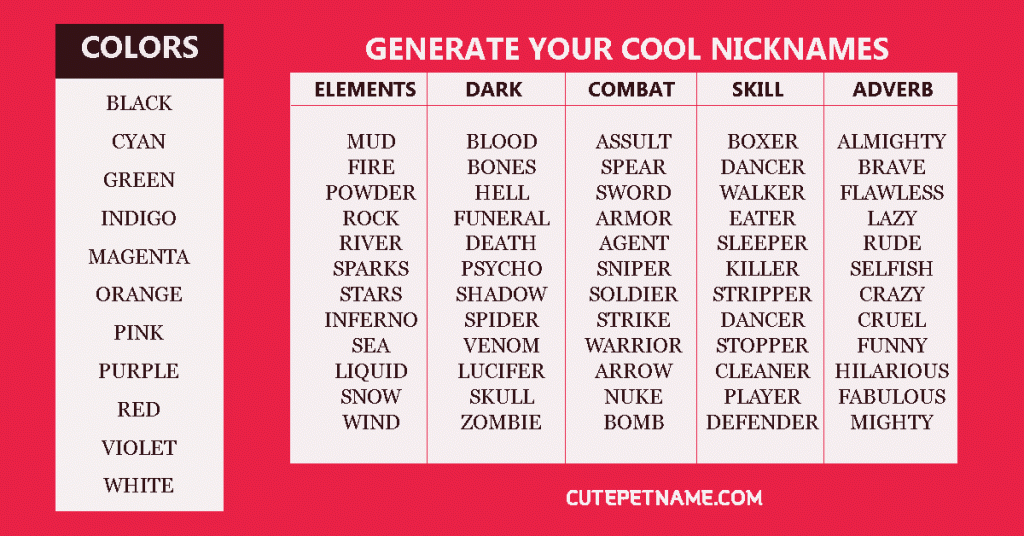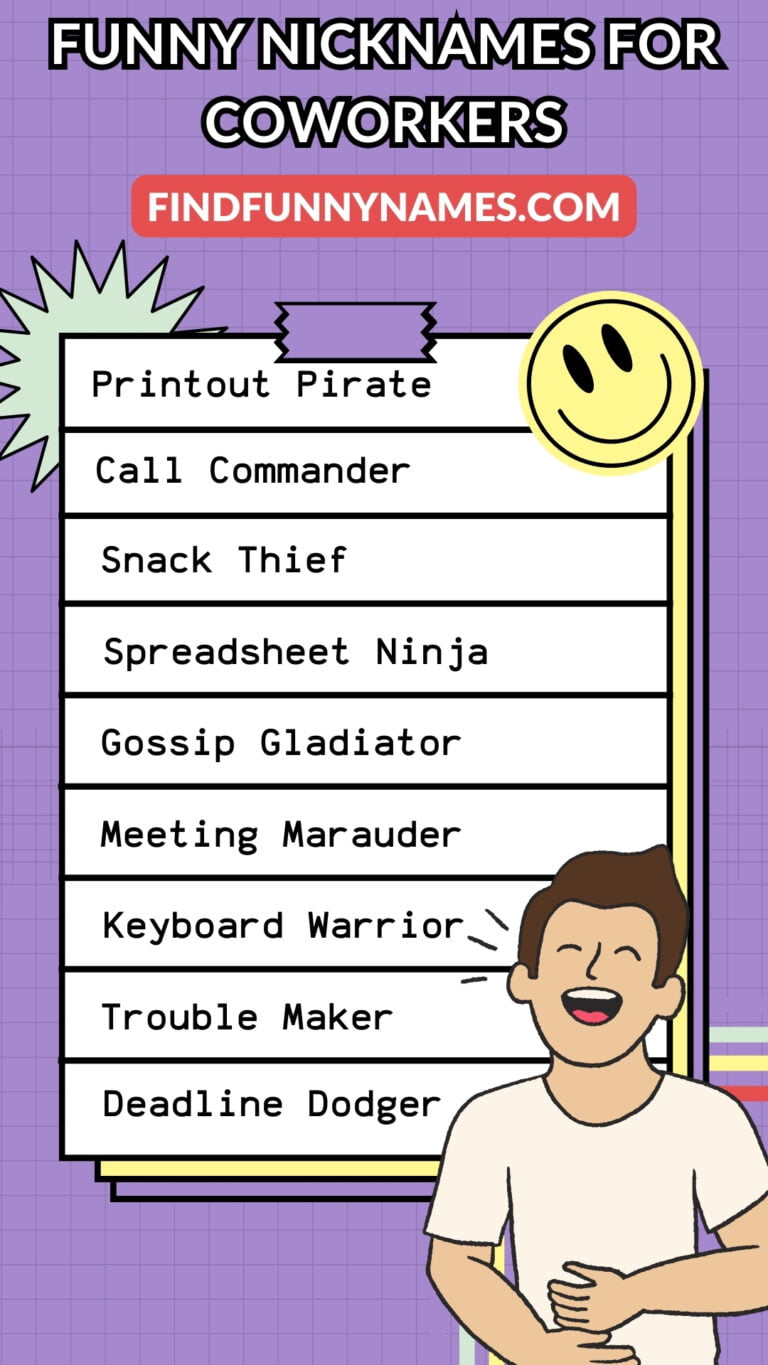Have you ever been called a rude nickname? Or maybe you’ve used one yourself without realizing the impact it could have? Rude nicknames are more than just playful teasing—they can leave lasting impressions, both positive and negative. In today’s world, where words hold immense power, understanding the nuances of rude nicknames is crucial. Whether it’s in school, at work, or even online, these nicknames can shape how people perceive themselves and others.
Let’s be real, we’ve all been there—someone gives you a nickname that sticks, and not always in a good way. Rude nicknames might seem harmless at first, but they can carry deeper meanings and consequences. They’re not just about fun or jokes; sometimes, they’re a reflection of deeper issues like bullying, cultural differences, or even societal norms.
So, why are we talking about rude nicknames? Well, it’s because they affect us more than we think. From affecting self-esteem to creating toxic environments, rude nicknames deserve a closer look. And trust me, by the end of this article, you’ll have a clearer picture of what they mean, how to deal with them, and how to avoid using them yourself.
What Are Rude Nicknames Anyway?
Rude nicknames are those not-so-nice names people call others, often intending to mock, belittle, or embarrass them. Think of it as a label that highlights someone’s flaws or perceived weaknesses. These nicknames can pop up anywhere—at home, in school, at work, or even in online spaces. The problem? They stick, and when they do, they can affect a person’s mental health and self-worth.
For example, if someone’s called "Chunky" because of their weight or "Four Eyes" because of their glasses, it’s not just a joke. It’s a form of labeling that can lead to feelings of inadequacy and low self-esteem. And let’s not forget, rude nicknames aren’t always obvious. Sometimes, they’re hidden in sarcasm or subtle comments that can still hurt just as much.
Why Do People Use Rude Nicknames?
There are plenty of reasons why someone might use a rude nickname. Some people do it because they want to fit in with a group, while others might use it as a way to assert dominance. Here’s a quick breakdown:
- Bullying: A classic reason. Some people use rude nicknames to belittle or tease others, often because they feel insecure themselves.
- Peer Pressure: Wanting to be part of the crowd can push people to adopt rude nicknames for others, even if they don’t mean it.
- Cultural Differences: In some cultures, nicknames might seem like a form of humor, but in others, they can be considered rude or offensive.
- Jealousy: Sometimes, people use rude nicknames out of jealousy, trying to bring others down to feel better about themselves.
So, the next time you hear someone using a rude nickname, take a moment to think about why they’re doing it. Is it out of malice, or is there something deeper going on?
The Psychological Impact of Rude Nicknames
Rude nicknames aren’t just words—they can have a profound impact on a person’s mental health. Imagine being called "Slowpoke" every time you try to express your opinion in a meeting. Over time, it can make you doubt your abilities and even stop you from speaking up altogether. This kind of nickname doesn’t just hurt in the moment; it can create long-term effects on self-esteem, confidence, and even career growth.
Studies have shown that name-calling, including rude nicknames, can lead to anxiety, depression, and even PTSD in extreme cases. It’s not just about the words themselves; it’s about the intent behind them and the environment in which they’re used. For instance, if someone uses a rude nickname in a workplace setting, it can create a toxic culture that affects everyone involved.
How Rude Nicknames Affect Different Age Groups
The impact of rude nicknames can vary depending on age. Let’s break it down:
- Children: Kids are especially vulnerable to rude nicknames. They’re still developing their sense of self, and being called a rude nickname can affect how they see themselves and interact with others.
- Teens: Adolescents are in a phase where peer approval is everything. A rude nickname can make them feel isolated or unworthy, leading to social withdrawal or even bullying others.
- Adults: Even as adults, rude nicknames can sting. They can affect workplace relationships, career advancement, and overall job satisfaction.
It’s important to recognize that no matter the age, rude nicknames can have serious consequences. They’re not just a phase or something to brush off—they’re a real issue that deserves attention.
Can Rude Nicknames Ever Be Funny?
Here’s the thing—sometimes, rude nicknames can be funny. But only if everyone involved is on the same page. Think about it: if your friend calls you "Captain Chaos" because you’re always late, and you both laugh about it, it’s probably okay. However, if the nickname makes you feel bad or embarrassed, it’s not funny anymore.
The key is context. A nickname that’s funny in one situation might not be in another. For example, calling someone "Sleepyhead" might be okay among friends, but using it in a professional setting could come across as unprofessional or even disrespectful.
How to Know If a Rude Nickname Is Funny or Harmful
Here are some signs to help you figure out whether a rude nickname is okay or not:
- Check the Reaction: If the person laughs or smiles, it’s probably fine. But if they seem uncomfortable or upset, it’s time to stop.
- Consider the Context: Is the nickname being used in a safe space, like among friends, or in a more formal setting, like work?
- Be Sensitive to Cultural Differences: What’s funny in one culture might not be in another. Always be mindful of cultural nuances.
Ultimately, it’s about being respectful and considerate. If you’re not sure whether a nickname is okay, it’s better to err on the side of caution.
Dealing with Rude Nicknames: Strategies That Work
So, what do you do if someone gives you a rude nickname? The first step is to take a deep breath and assess the situation. Here are some strategies that can help:
- Confront the Person: Sometimes, all it takes is a calm conversation to let the other person know how their words affect you.
- Ignore It: If the nickname isn’t affecting you too much, ignoring it might be the best option. Let it roll off your back.
- Change the Narrative: Turn the nickname into something positive. For example, if someone calls you "Slowpoke," embrace it by saying, "Yeah, I’m slow, but I get things done right!"
Remember, you have the power to control how you react to rude nicknames. Don’t let them define you or affect your self-worth.
When to Seek Help
Sometimes, rude nicknames can escalate into something more serious, like bullying or harassment. If that happens, it’s important to seek help. Talk to a trusted friend, family member, or even a professional counselor. You don’t have to deal with it alone.
Rude Nicknames in the Workplace
Workplace environments should be respectful and professional, but rude nicknames can still slip in. Whether it’s from a colleague or even a superior, these nicknames can create a toxic atmosphere that affects everyone. For instance, calling someone "Slacker" because they take longer to complete tasks can lead to resentment and decreased productivity.
Companies should have clear policies in place to address rude nicknames and other forms of disrespectful behavior. Employees should feel safe reporting incidents without fear of retaliation. Creating a culture of respect and inclusivity is key to preventing rude nicknames from becoming a problem in the workplace.
How to Address Rude Nicknames at Work
If you encounter rude nicknames at work, here’s what you can do:
- Document the Incidents: Keep a record of when and where the nickname was used, as well as who was involved.
- Talk to HR: If the situation doesn’t improve, it’s time to involve human resources. They can help mediate the situation and implement necessary changes.
- Set Boundaries: Let your colleagues know what nicknames or comments are unacceptable to you. Clear communication is key.
By addressing rude nicknames early, you can prevent them from becoming a bigger issue down the line.
Rude Nicknames in Pop Culture
Pop culture is full of examples of rude nicknames, both in movies and real life. From characters in films to celebrities in the media, rude nicknames have been used to create drama, humor, or even controversy. For example, think about how characters in movies like "Mean Girls" or "The Breakfast Club" use nicknames to assert dominance or create cliques.
In real life, celebrities often deal with rude nicknames from the media or fans. While some embrace them, others find them hurtful and damaging. It’s a reminder that even those in the spotlight aren’t immune to the effects of rude nicknames.
Famous Examples of Rude Nicknames in Media
Here are a few famous examples of rude nicknames in pop culture:
- Paris Hilton: Often called "Socialite" or "Heiress," some nicknames can be seen as mocking her privileged lifestyle.
- Tom Brady: Known as "GOAT" (Greatest of All Time), but also sometimes called "Lucky" due to controversial game situations.
- Taylor Swift: Dubbed "Snake" by some critics, referencing her alleged betrayal of friends.
These examples show how rude nicknames can shape public perception, for better or worse.
The Role of Education in Preventing Rude Nicknames
Education plays a crucial role in preventing the use of rude nicknames. Schools, workplaces, and communities can implement programs that promote respect, empathy, and understanding. By teaching people the impact of words, we can create environments where rude nicknames are less likely to occur.
For example, schools can incorporate lessons on cyberbullying and name-calling into their curriculum. Workplaces can offer workshops on communication and conflict resolution. Even community groups can host events that encourage open dialogue and understanding.
How Parents Can Help
Parents have a unique opportunity to shape how their children view and use language. By modeling respectful behavior and teaching their kids about the impact of words, they can help prevent the use of rude nicknames. Encourage open communication and create a safe space where kids feel comfortable discussing issues like bullying or name-calling.
Conclusion: Let’s Stop the Nicknames
In conclusion, rude nicknames might seem like a small issue, but they can have a big impact on people’s lives. From affecting self-esteem to creating toxic environments, they’re something we should all be mindful of. By understanding the reasons behind rude nicknames and learning how to deal with them, we can create a more respectful and inclusive world.
So, the next time you hear or use a rude nickname, take a moment to think about its impact. And remember, words matter. Let’s all commit to using language that uplifts and empowers, rather than tears down.
Call to Action: Share this article with your friends and family to spread awareness about the impact of rude nicknames. Together, we can make a difference!
Table of Contents


